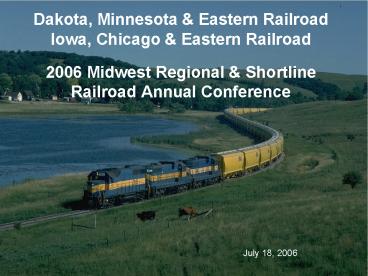Dakota, Minnesota - PowerPoint PPT Presentation
1 / 23
Title:
Dakota, Minnesota
Description:
Business & economic development community. Energy industry (on and off line) ... Will allow continued expansion of ag processing and related industries major ... – PowerPoint PPT presentation
Number of Views:32
Avg rating:3.0/5.0
Title: Dakota, Minnesota
1
Dakota, Minnesota Eastern RailroadIowa,
Chicago Eastern Railroad2006 Midwest Regional
ShortlineRailroad Annual Conference
July 18, 2006
2
(No Transcript)
3
(No Transcript)
4
History Of Growth Has Created
- Largest Class II Contiguous Railroad System in
the U.S. - 2,500 Miles of Track in 8 States
- 250,000 Carloads of Freight
- 8,000 Freight Cars
- 150 Locomotives
- 1,000 Employees
5
(No Transcript)
6
(No Transcript)
7
(No Transcript)
8
(No Transcript)
9
DME/ICE Ethanol Plants
- Production Capacity
- (Millions of Gallons)
- 6 Existing Plants 265
- 4 Building/Expanding Plants 235
- Subtotal 500
- 7 Announced Plants 600
- 10 Potential Plants 900
- Total Potential 2,000
10
DME/ICE Considerations for Prospective Ethanol
Plants (Continued)
- Is existing rail infrastructure adequate to
support the potential traffic - Is there a reasonable expectation of success
- Number of plants in close proximity - too many
plants in too small an area can create a problem - What is the quality of the business plan and do
the investors understand the business and its
risks - Effect on current customers
11
DME/ICE Considerations for Prospective Ethanol
Plants (Continuation)
- Rail Infrastructure Required
- Must have adequate track/yard capacity to store
private rail equipment, as well as allow
switching of all commodities. - Must be able to clear the mainline track quickly
- Must have ability to weigh rail shipments
(potential overloads)
12
DME/ICE Considerations for Prospective Ethanol
Plants (Continuation)
- Track Designs
- Minimize road crossings
- Minimize rail grade issues
- Locate switches on straight track
- Sufficient trackage for locomotives and railcars
to clear mainline track - Safety clearances at road crossings
13
DME/ICE Considerations for Prospective Ethanol
Plants (Concluded)
- Logistical Considerations Involved
- Single car versus unit train service
- Targeted markets and anticipated rail car cycle
times drives fleet sizing issue - Rail car ownership/supply issues
- Private vs railroad
- Lead times for new rail equipment
- Implications on existing railroad grain car fleet
sizing
14
Track Capital Expenditures
- 3-Year Average of Track Capital Expenditure
Dollars as a Percentage of Total Revenue - DME/ICE 23
- Class Is 13
15
DME/ICE Significant Track Projects2004 2006
Construction Years
- 210 miles of new 136 lbs continuous welded rail
- 580,000 ties installed
- 650,000 tons of ballast
- 2,600 miles of track surfaced
- 6 new or extended passing tracks
16
(No Transcript)
17
Powder River Basin Expansion and Rehabilitation
Project
- 280 miles of new main line construction
- 600 miles of rebuild of DME existing main line
- Construction cost 2 billion
- Construction timeline 3 seasons
- 100 million tons of new capacity
18
Rehabilitated Rail Advantages (Continued)
- Better service to ethanol and agricultural
customers - Improved safety
- Faster trains (customer efficiency traffic
improved) - Quieter trains (CWR, wayside noise)
- Reduced truck traffic less highway deterioration
- Greater reliability of rail service
19
Rehabilitated Rail Advantages (Concluded)
- Improved grain prices
- Energy efficiency
- Expanded market reach
- Long-term infrastructure stability
- Economic Development
- Existing customer expansion
- New customer additions
20
Supporters of PRB Expansion and Rehabilitation
Project
- 55 out of 56 communities on the line support
- Agreements with majority of landowners
- Current shippers
- Agriculture community (local, state national)
- Business economic development community
- Energy industry (on and off line)
- National organizations
- State Federal political leaders
21
GOTRAC Support Organization Formed
- Growth Opportunities Through Rail Access
Coalition - GOTRAC has nearly 90 members that actively
support the PRB expansion and rehabilitation
project. - Communities
- Economic Development Organizations
- Shippers
- Associations Trade Organizations
22
Summary (Continued)
- Rebuilt DME/ICE Railroad system provides growth
opportunities for agriculture and rail-served
industries - Will correct decades of railroad track deferred
maintenance - Ensure long-term rail viability at higher
standards of performance and service
23
Summary (Concluded)
- Will allow continued expansion of ag processing
and related industries major growth area for
rail industry - Will improve competitive transportation options
for our customers and improve financial returns
for all stakeholders































